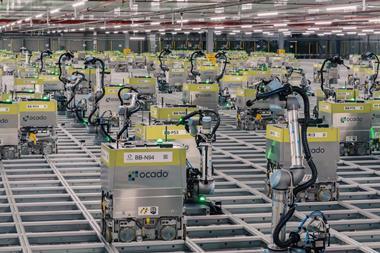It’s had to endure three years of doubt and pessimism, but Ocado’s warehouse retail platform is set to pay off, as Ronan Hegarty reports
As Ocado approaches its fourth birthday in January, chief executive Tim Steiner says that the online shopping operation is almost ready to start making real money.
Having incurred operational losses of £39.4m and £37.8m in 2003 and 2004 respectively, Steiner claims that sales at the specialist online grocery retailer are now paying for everything in the business except the cost of the staff at its HQ in Hatfield.
It will begin making actual profit during the course of next year, says Steiner. This, he says, will happen as Ocado continues to expand its reach into new areas of the UK.
Ocado currently covers 11 million households or 40% of the UK population. While Tesco’s online operation covers 97% of the UK, Ocado is currently involved in a war of words with Sainsbury over who is the second-biggest online grocery retailer.
Jason Gissing, the company’s outspoken chief financial officer, is happy to stir the pot, claiming that should Sainsbury come up with an audited weekly sales number that is bigger than Ocado’s, then he would donate £10,000 to a charity of its choice.
This challenge underlines the pride that Gissing and Steiner, along with fellow co-founder and chief operating officer Jonathan Faiman, have in a business that they claim has been knocked by its rivals since day one. While its competitors are today sourcing online deliveries from local stores, Ocado offers a groceries from its partner Waitrose that it distributes through a network of depots supplied from its main warehouse in Hatfield.
Steiner says that Tesco’s plan to open its own warehouse specifically for online deliveries in the south east of England is a vindication of the way Ocado does business. He says: “For years, Tesco has been saying that the warehouse model is not workable, so it is interesting to see it moving that way. Whether it will be running the warehouse in the way that Ocado does is difficult to say. It takes an incredible amount of effort to make this work.”
In June, Ocado picked up The Grocer Gold award for online retailer of the year and Faiman puts this achievement down to it being “maniacal about efficiency”.
“When you are delivering orders from a warehouse, your processes have to be more robust than with in-store picking. Our operation is like a production site, we manufacture orders but unlike other production facilities with one or two different lines, we could be putting together 7,000 different varieties of order,” says Steiner.
In the course of the last four The Grocer 33 online shopping surveys, Ocado has had just five out of stocks, two of which were substituted to the customers’ satisfaction, making it the most consistent online retailer.
He points out that Tesco’s move is not the first time that Ocado’s approach has been mimicked by its rivals. He suggests that recent revamps of both Tesco’s and Sainsbury’s ordering sites owe a debt to Ocado’s platform. However he remains confident that constant upgrading of Ocado’s technology means that it will continue to lead the way.
Steiner boasts: “I’m not sure if our competitors realise this or not, but our site is intelligent and becomes increasingly easy to work with the more a customer uses it.
“For instance, if three different Ocado shoppers simply typed in the word milk, they would be likely to bring up three completely different products depending on the individual’s previous preferences.
“Our customers can literally place a £200 order in two or three minutes. We will be introducing a number of changes to the site over
the next couple of months that will make ordering even easier.”
The online grocery market in the UK is currently worth just over £1bn, and Steiner sees no reason why it will not simply grow and grow. With more people becoming computer-savvy and pressures on people’s time continuing to mount up, the number of people for whom internet shopping is an attractive proposition could seriously rocket.
He suggests that online shopping could grow to account for 10-15% of the UK grocery market in the next five to 10 years and could be worth £10bn.
If this is to happen, he says, both Ocado and its supermarket rivals will need to up their games. In Ocado’s case, this means growing its geographical capacity without compromising its high standards.
Last month it opened a new depot in Southampton, which greatly increased its coverage of the south of England, and while Steiner admits there are areas it may never cover it has ambitious plans to grow.
It has identified sites for development in Bristol, Leeds, Sheffield and Nottingham that will vastly increase its coverage. “We have worked hard on our systems this year, which meant we could not grow as fast as we had the previous year. However as we improve our processes this will make it easier for us to grow in the future,” he says.
As it grows Ocado is looking to extend its range but has no plans to move away from its traditional grocery offering and take on the other retailers in terms of non food.
Steiner says: “We certainly want to improve our range but for the time being that means concentrating on grocery. I won’t say that some time down the line we won’t sell books or recordable DVD players, but for the time being we want to sell more of the same to more people.”
Overall, Steiner has a clear picture of where he wants Ocado to go. Ocado aims to allow its customers to get what they want, when they want it and with minimum fuss.
He says: “The philosophy is simple, however living up to this is extremely difficult, so as we grow it is important that we work as hard as we can to maintain our focus.”
As Ocado approaches its fourth birthday in January, chief executive Tim Steiner says that the online shopping operation is almost ready to start making real money.
Having incurred operational losses of £39.4m and £37.8m in 2003 and 2004 respectively, Steiner claims that sales at the specialist online grocery retailer are now paying for everything in the business except the cost of the staff at its HQ in Hatfield.
It will begin making actual profit during the course of next year, says Steiner. This, he says, will happen as Ocado continues to expand its reach into new areas of the UK.
Ocado currently covers 11 million households or 40% of the UK population. While Tesco’s online operation covers 97% of the UK, Ocado is currently involved in a war of words with Sainsbury over who is the second-biggest online grocery retailer.
Jason Gissing, the company’s outspoken chief financial officer, is happy to stir the pot, claiming that should Sainsbury come up with an audited weekly sales number that is bigger than Ocado’s, then he would donate £10,000 to a charity of its choice.
This challenge underlines the pride that Gissing and Steiner, along with fellow co-founder and chief operating officer Jonathan Faiman, have in a business that they claim has been knocked by its rivals since day one. While its competitors are today sourcing online deliveries from local stores, Ocado offers a groceries from its partner Waitrose that it distributes through a network of depots supplied from its main warehouse in Hatfield.
Steiner says that Tesco’s plan to open its own warehouse specifically for online deliveries in the south east of England is a vindication of the way Ocado does business. He says: “For years, Tesco has been saying that the warehouse model is not workable, so it is interesting to see it moving that way. Whether it will be running the warehouse in the way that Ocado does is difficult to say. It takes an incredible amount of effort to make this work.”
In June, Ocado picked up The Grocer Gold award for online retailer of the year and Faiman puts this achievement down to it being “maniacal about efficiency”.
“When you are delivering orders from a warehouse, your processes have to be more robust than with in-store picking. Our operation is like a production site, we manufacture orders but unlike other production facilities with one or two different lines, we could be putting together 7,000 different varieties of order,” says Steiner.
In the course of the last four The Grocer 33 online shopping surveys, Ocado has had just five out of stocks, two of which were substituted to the customers’ satisfaction, making it the most consistent online retailer.
He points out that Tesco’s move is not the first time that Ocado’s approach has been mimicked by its rivals. He suggests that recent revamps of both Tesco’s and Sainsbury’s ordering sites owe a debt to Ocado’s platform. However he remains confident that constant upgrading of Ocado’s technology means that it will continue to lead the way.
Steiner boasts: “I’m not sure if our competitors realise this or not, but our site is intelligent and becomes increasingly easy to work with the more a customer uses it.
“For instance, if three different Ocado shoppers simply typed in the word milk, they would be likely to bring up three completely different products depending on the individual’s previous preferences.
“Our customers can literally place a £200 order in two or three minutes. We will be introducing a number of changes to the site over
the next couple of months that will make ordering even easier.”
The online grocery market in the UK is currently worth just over £1bn, and Steiner sees no reason why it will not simply grow and grow. With more people becoming computer-savvy and pressures on people’s time continuing to mount up, the number of people for whom internet shopping is an attractive proposition could seriously rocket.
He suggests that online shopping could grow to account for 10-15% of the UK grocery market in the next five to 10 years and could be worth £10bn.
If this is to happen, he says, both Ocado and its supermarket rivals will need to up their games. In Ocado’s case, this means growing its geographical capacity without compromising its high standards.
Last month it opened a new depot in Southampton, which greatly increased its coverage of the south of England, and while Steiner admits there are areas it may never cover it has ambitious plans to grow.
It has identified sites for development in Bristol, Leeds, Sheffield and Nottingham that will vastly increase its coverage. “We have worked hard on our systems this year, which meant we could not grow as fast as we had the previous year. However as we improve our processes this will make it easier for us to grow in the future,” he says.
As it grows Ocado is looking to extend its range but has no plans to move away from its traditional grocery offering and take on the other retailers in terms of non food.
Steiner says: “We certainly want to improve our range but for the time being that means concentrating on grocery. I won’t say that some time down the line we won’t sell books or recordable DVD players, but for the time being we want to sell more of the same to more people.”
Overall, Steiner has a clear picture of where he wants Ocado to go. Ocado aims to allow its customers to get what they want, when they want it and with minimum fuss.
He says: “The philosophy is simple, however living up to this is extremely difficult, so as we grow it is important that we work as hard as we can to maintain our focus.”



















No comments yet